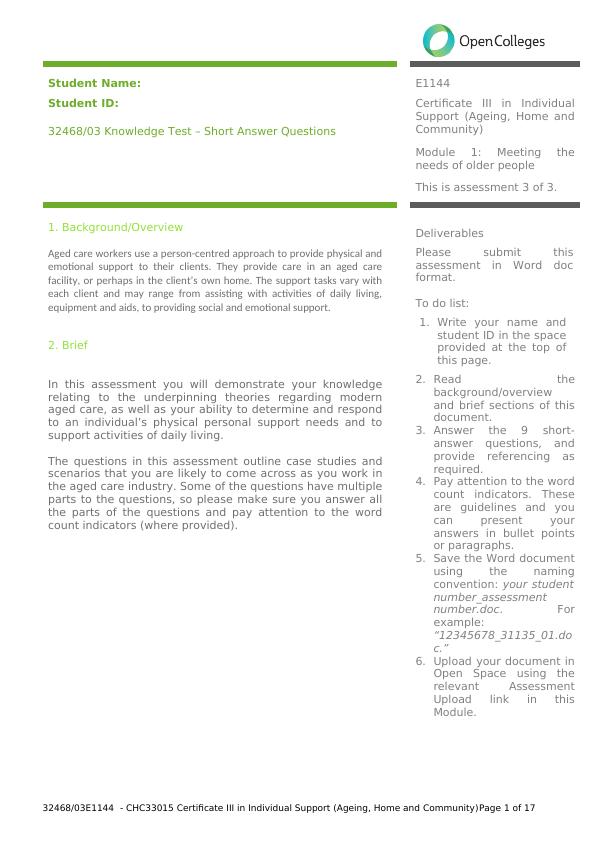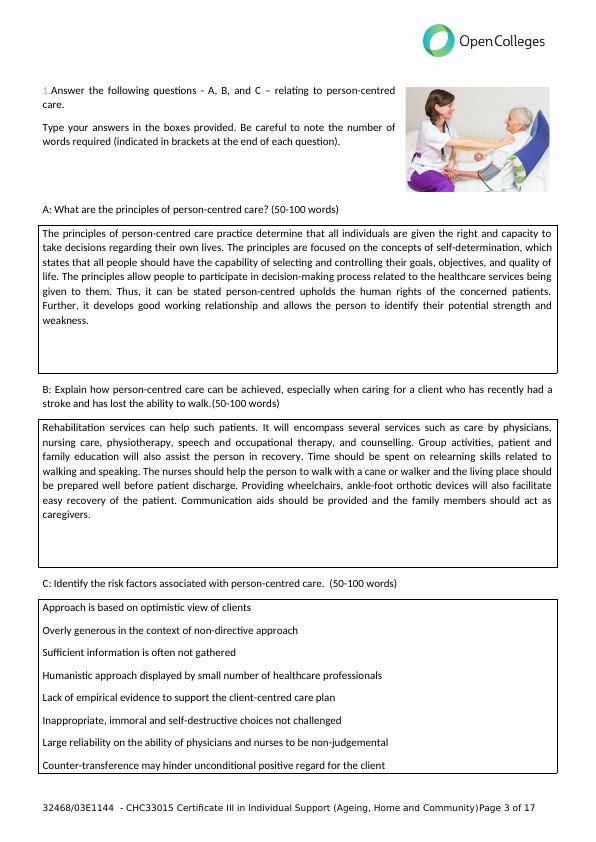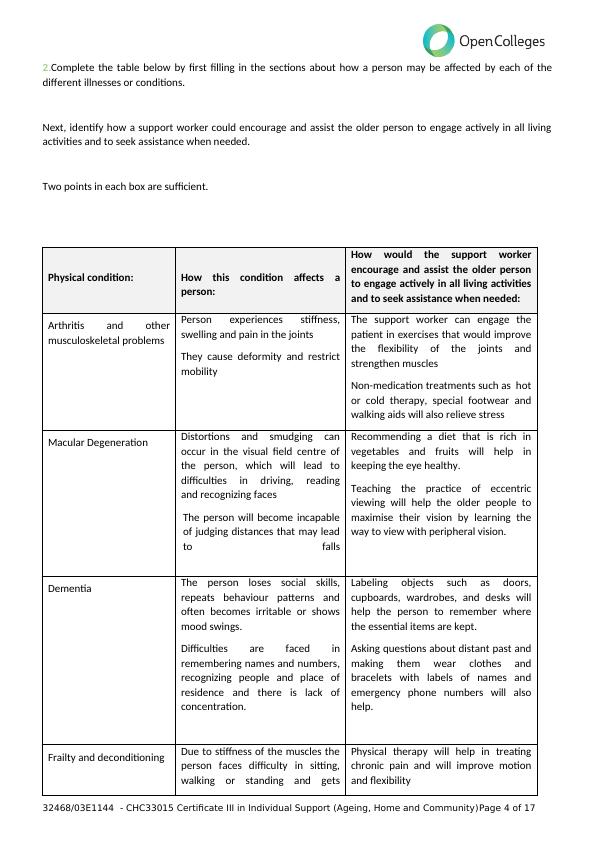Ask a question from expert
E1144 Certificate III in Individual Support Doc
17 Pages5421 Words211 Views
Added on 2020-04-21
E1144 Certificate III in Individual Support Doc
Added on 2020-04-21
BookmarkShareRelated Documents
Student Name:Student ID:32468/03 Knowledge Test – Short Answer QuestionsE1144Certificate III in IndividualSupport (Ageing, Home andCommunity)Module 1: Meeting theneeds of older peopleThis is assessment 3 of 3.1. Background/OverviewAged care workers use a person-centred approach to provide physical andemotional support to their clients. They provide care in an aged carefacility, or perhaps in the client’s own home. The support tasks vary witheach client and may range from assisting with activities of daily living,equipment and aids, to providing social and emotional support. 2. BriefIn this assessment you will demonstrate your knowledgerelating to the underpinning theories regarding modernaged care, as well as your ability to determine and respondto an individual’s physical personal support needs and tosupport activities of daily living. The questions in this assessment outline case studies andscenarios that you are likely to come across as you work inthe aged care industry. Some of the questions have multipleparts to the questions, so please make sure you answer allthe parts of the questions and pay attention to the wordcount indicators (where provided).DeliverablesPlease submit thisassessment in Word docformat.To do list:1.Write your name andstudent ID in the spaceprovided at the top ofthis page. 2.Readthebackground/overviewand brief sections of thisdocument.3.Answer the 9 short-answer questions, andprovide referencing asrequired.4.Pay attention to the wordcount indicators. Theseare guidelines and youcan present youranswers in bullet pointsor paragraphs.5.Save the Word documentusing the namingconvention: your studentnumber_assessmentnumber.doc.Forexample:“12345678_31135_01.doc.”6.Upload your document inOpen Space using therelevant AssessmentUpload link in thisModule.32468/03E1144 - CHC33015 Certificate III in Individual Support (Ageing, Home and Community)Page 1 of 17

3. ActivitiesAnswer the following 9 short-answer questions:Your written answers should be approximate 50-100 words in length (+/-10%) perquestion. The word count is a guideline and you can present your answers innarrative or bullet point format.Ensure you acknowledge and cite your sources accordingly – this is importantwhether you use your own words or another writer’s. You can review the AcademicReferencing Guide in your student handbook.32468/03E1144 - CHC33015 Certificate III in Individual Support (Ageing, Home and Community)Page 2 of 17

1.Answer the following questions - A, B, and C – relating to person-centredcare. Type your answers in the boxes provided. Be careful to note the number ofwords required (indicated in brackets at the end of each question).A: What are the principles of person-centred care? (50-100 words)The principles of person-centred care practice determine that all individuals are given the right and capacity totake decisions regarding their own lives. The principles are focused on the concepts of self-determination, whichstates that all people should have the capability of selecting and controlling their goals, objectives, and quality oflife. The principles allow people to participate in decision-making process related to the healthcare services beinggiven to them. Thus, it can be stated person-centred upholds the human rights of the concerned patients.Further, it develops good working relationship and allows the person to identify their potential strength andweakness.B: Explain how person-centred care can be achieved, especially when caring for a client who has recently had astroke and has lost the ability to walk.(50-100 words)Rehabilitation services can help such patients. It will encompass several services such as care by physicians,nursing care, physiotherapy, speech and occupational therapy, and counselling. Group activities, patient andfamily education will also assist the person in recovery. Time should be spent on relearning skills related towalking and speaking. The nurses should help the person to walk with a cane or walker and the living place shouldbe prepared well before patient discharge. Providing wheelchairs, ankle-foot orthotic devices will also facilitateeasy recovery of the patient. Communication aids should be provided and the family members should act ascaregivers. C: Identify the risk factors associated with person-centred care. (50-100 words)Approach is based on optimistic view of clientsOverly generous in the context of non-directive approachSufficient information is often not gatheredHumanistic approach displayed by small number of healthcare professionalsLack of empirical evidence to support the client-centred care planInappropriate, immoral and self-destructive choices not challengedLarge reliability on the ability of physicians and nurses to be non-judgementalCounter-transference may hinder unconditional positive regard for the client 32468/03E1144 - CHC33015 Certificate III in Individual Support (Ageing, Home and Community)Page 3 of 17

2.Complete the table below by first filling in the sections about how a person may be affected by each of thedifferent illnesses or conditions. Next, identify how a support worker could encourage and assist the older person to engage actively in all livingactivities and to seek assistance when needed. Two points in each box are sufficient.Physical condition:How this condition affects aperson:How would the support workerencourage and assist the older personto engage actively in all living activitiesand to seek assistance when needed:Arthritis and othermusculoskeletal problemsPerson experiences stiffness,swelling and pain in the jointsThey cause deformity and restrictmobilityThe support worker can engage thepatient in exercises that would improvethe flexibility of the joints andstrengthen musclesNon-medication treatments such as hotor cold therapy, special footwear andwalking aids will also relieve stressMacular DegenerationDistortions and smudging canoccur in the visual field centre ofthe person, which will lead todifficulties in driving, readingandrecognizing facesThe person will become incapableof judging distances that may leadtofallsRecommending a diet that is rich invegetables and fruits will help inkeeping the eye healthy.Teaching the practice of eccentricviewing will help the older people tomaximise their vision by learning theway to view with peripheral vision.DementiaThe person loses social skills,repeats behaviour patterns andoften becomes irritable or showsmood swings.Difficulties are faced inremembering names and numbers,recognizing people and place ofresidence and there is lack ofconcentration.Labeling objects such as doors,cupboards, wardrobes, and desks willhelp the person to remember wherethe essential items are kept.Asking questions about distant past andmaking them wear clothes andbracelets with labels of names andemergency phone numbers will alsohelp.Frailty and deconditioningDue to stiffness of the muscles theperson faces difficulty in sitting,walking or standing and getsPhysical therapy will help in treatingchronic pain and will improve motionand flexibility32468/03E1144 - CHC33015 Certificate III in Individual Support (Ageing, Home and Community)Page 4 of 17

End of preview
Want to access all the pages? Upload your documents or become a member.
Related Documents
E1144 : Certificate III in Individual Supportlg...
|17
|5337
|35
Assessment 32468/02 Knowledge Testlg...
|22
|5243
|424
Health Services Assignment PDFlg...
|19
|5306
|26
Verbal and Non verbal Strategies : Assignmentlg...
|18
|6088
|218
Assessment 3 - Working with Clientslg...
|20
|6099
|76
E1144 Certificate III in Individual Support (Ageing, Home and Community)lg...
|25
|10566
|424